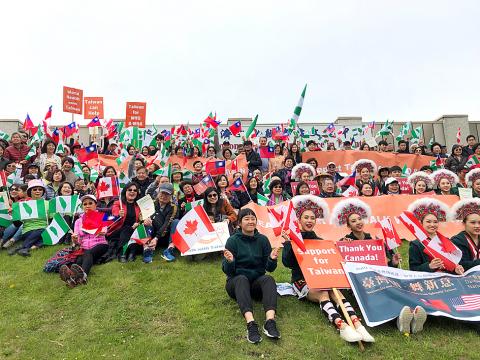More than 5,000 people in Japan have signed a petition supporting Taiwan’s participation at the World Health Assembly (WHA) in Geneva, Switzerland, this month.
The petition was initiated by Taiwan-linked non-governmental groups.
Taiwan has not received an invitation to attend the May 20 to 28 summit of the WHA, the WHO’s decisionmaking body, for the third consecutive year due to Chinese obstruction.

Photo: CNA
Several Taiwanese groups in Japan — including the Taiwan Benevolent Association of Northern Kyushu, the West Japan Taiwan Alumni Association and the Chinese Society of Fukushima Prefecture — initiated the petition in late March.
The groups on Saturday presented the signatures to Minister of Health and Welfare Chen Shih-chung (陳時中), who was visiting Kyushu with a delegation of healthcare officials, academics and businesspeople for the Asia-Pacific Conference.
More than 5,000 people, including Japanese healthcare professionals, politicians, businesspeople, media professionals and Taiwanese expats signed the petition, the groups said.
The government has sought to have the nation recognized, and participate in cooperation and exchanges on global healthcare issues since Taiwan was excluded from the WHA in 2016, the ministry said.
Taiwan has expertise in the medical and public health fields, so hopefully many nations and overseas Taiwanese would support the nation, allowing it to realize the concept of “health for all,” it said.
In Canada on Saturday, nearly 300 Taiwanese attended a walk event in Toronto to show support for Taiwan’s participation at the WHA and their gratitude to the Canadian government for supporting the nation’s bid.
Attendees walked and waved Republic of China (ROC) flags while holding signs that read: “Support for Taiwan,” “Thank you, Canada,” “Taiwan for WHO & WHA” and “World health needs Taiwan.”
Representative to Canada Catherine Hsu (徐詠梅) said that health is a basic human right and no one should be excluded from it for any reason.
Taiwan can make significant contributions to global disease prevention and healthcare, Hsu said.
The Ministry of Foreign Affairs said that lawmakers from the Czech Republic and Peru have expressed their support for Taiwan to participate at the WHA.
In a letter addressed to WHO Director-General Tedros Adhanom Ghebreyesus, the Czech lawmakers asked that Taiwan not be excluded from the body, saying it was unfair to deny the nation’s 23 million people access to the global disease prevention system.
In a separate declaration, Peruvian lawmakers praised Taiwan’s advances in the fields of healthcare and health insurance, and supported Taiwan’s professional and pragmatic participation at the WHO and WHA so that it could share its medical technology and experience with countries around the world.
Additional reporting by CNA

CHAOS: Iranians took to the streets playing celebratory music after reports of Khamenei’s death on Saturday, while mourners also gathered in Tehran yesterday Iranian Supreme Leader Ayatollah Ali Khamenei was killed in a major attack on Iran launched by Israel and the US, throwing the future of the Islamic republic into doubt and raising the risk of regional instability. Iranian state television and the state-run IRNA news agency announced the 86-year-old’s death early yesterday. US President Donald Trump said it gave Iranians their “greatest chance” to “take back” their country. The announcements came after a joint US and Israeli aerial bombardment that targeted Iranian military and governmental sites. Trump said the “heavy and pinpoint bombing” would continue through the week or as long

TRUST: The KMT said it respected the US’ timing and considerations, and hoped it would continue to honor its commitments to helping Taiwan bolster its defenses and deterrence US President Donald Trump is delaying a multibillion-dollar arms sale to Taiwan to ensure his visit to Beijing is successful, a New York Times report said. The weapons sales package has stalled in the US Department of State, the report said, citing US officials it did not identify. The White House has told agencies not to push forward ahead of Trump’s meeting with Chinese President Xi Jinping (習近平), it said. The two last month held a phone call to discuss trade and geopolitical flashpoints ahead of the summit. Xi raised the Taiwan issue and urged the US to handle arms sales to

BIG SPENDERS: Foreign investors bought the most Taiwan equities since 2005, signaling confidence that an AI boom would continue to benefit chipmakers Taiwan Semiconductor Manufacturing Co’s (TSMC, 台積電) market capitalization swelled to US$2 trillion for the first time following a 4.25 percent rally in its American depositary receipts (ADR) overnight, putting the world’s biggest contract chipmaker sixth on the list of the world’s biggest companies by market capitalization, just behind Amazon.com Inc. The site CompaniesMarketcap.com ranked TSMC ahead of Saudi Aramco and Meta Platforms Inc. The Taiwanese company’s ADRs on Tuesday surged to US$385.75 on the New York Stock Exchange, as strong demand for artificial intelligence (AI) applications led to chip supply constraints and boost revenue growth to record-breaking levels. Each TSMC ADR represents

State-run CPC Corp, Taiwan (CPC, 台灣中油) yesterday said that it had confirmed on Saturday night with its liquefied natural gas (LNG) and crude oil suppliers that shipments are proceeding as scheduled and that domestic supplies remain unaffected. The CPC yesterday announced the gasoline and diesel prices will rise by NT$0.2 and NT$0.4 per liter, respectively, starting Monday, citing Middle East tensions and blizzards in the eastern United States. CPC also iterated it has been reducing the proportion of crude oil imports from the Middle East and diversifying its supply sources in the past few years in response to geopolitical risks, expanding